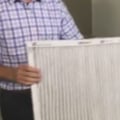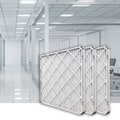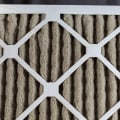Enhancing Home HVAC Air Filter Replacements with the Right MERV Rating
To optimize HVAC air filter replacements in your dwelling, it's vital to grasp the concept of MERV ratings. These ratings stretch from 1 to 16, with larger figures pointing to more comprehensive filtration. But remember, bigger isn't always better in this context. Ultra-high ratings can sometimes choke airflow, putting undue pressure on your HVAC equipment.
Rather than chasing the highest rating, aim to find a balance. Start by examining your HVAC gear's specific needs, think about the air quality your home requires, and weigh up the pros and cons of higher MERV ratings. Picking the right filter in this way contributes to better indoor air quality while preserving your HVAC system's efficiency, and prolonging its life.
Moreover, being aware of how often to replace filters and how to handle allergens effectively can significantly enhance the air quality in your dwelling without denting your HVAC unit's energy efficiency. So, let's dive in for a detailed understanding of this vital equilibrium.
Key Takeaways
Begin by understanding the specifications of your HVAC system, then select air filters with appropriate MERV ratings.
Allergy management, along with energy efficiency, should play a role in MERV rating selection.
To maintain high-quality air and optimal performance, make regular air filter replacements a priority.
Correct fit of filters is crucial, watch for airflow issues following installation.
Weighing costs of filters, indoor air quality, and changes in seasons can help decide the ideal timing for home HVAC air filter replacements.
Understanding the MERV Rating System
To optimize HVAC air filter replacements, comprehension of the MERV rating system is crucial. MERV, standing for Minimum Efficiency Reporting Value, assesses air filter efficiency. Unraveling its origins can clear up typical MERV misunderstandings.
Established in the late 1980s by the American Society of Heating, Refrigerating, and Air-Conditioning Engineers (ASHRAE), MERV isn't a sales ploy but a genuine, recognized industry standard. Ratings span from 1 to 16, with higher numbers indicating finer filtration. Yet, contrary to popular belief, a higher score doesn't always imply superiority.
MERV ratings reflect the filter's capacity to trap specific air particles. While high MERV ratings signify the filter's ability to capture smaller particles, this doesn't automatically make them the optimal choice for all HVAC systems. Filter effectiveness needs balancing with the system's airflow. Overly dense filters can hinder airflow, forcing the system to work harder, which can lead to escalating energy costs and potential system damage. Hence, understanding MERV is vital for HVAC air filter optimization.
Importance of Correct MERV Rating
Opting for the right MERV rating on your HVAC system plays a pivotal role in ensuring efficient performance and extended lifespan. Many people mistakenly think that the highest rating, typically 16, is always superior. However, while MERV 16 filters excel at trapping tiny particles and allergens inside homes, this high efficiency may restrict airflow if your system isn't equipped to handle it, potentially reducing lifespan.
Considering indoor air quality is another essential aspect. Allergens in your home such as dust mites, pet dander, or pollen can pose health risks, especially for those with allergies or asthma. Choosing the right MERV rating can significantly lessen these allergens, leading to improved air quality inside your home.
In addition, selecting the appropriate filter rating aids in maintaining energy efficiency. Filters that are too restrictive can overwork your system, resulting in higher energy use and increased costs. On the flip side, inefficient filters won't clean the air effectively, jeopardizing your health and comfort.
Identifying Your HVAC Needs
Before you rush to replace your HVAC air filter, it's crucial to understand your specific needs. You need to grasp your HVAC system specifications, assess the quality of air in your home, and choose the right MERV rating.
These steps will ensure you make an informed decision that optimizes your HVAC's efficiency and improves your home's air quality.
Understanding HVAC System Specifications
Understanding HVAC system specifications equips you with the knowledge to accurately pinpoint your heating and cooling needs. Lifespan, typically ranging from 15 to 25 years, deserves consideration. If nearing the end of this period, planning for replacement becomes advisable.
Energy consumption is also a significant aspect. Systems consuming excessive energy can inflate utility bills. Hence, verifying the Energy Star rating is advisable. A low rating might prompt you to think about upgrading for improved efficiency.
Grasping these specifications aids in optimizing system performance, reducing energy use, and prolonging lifespan. Keep in mind that a better understanding makes choosing the right MERV rating for air filters easier.
Assessing Home Air Quality
Considering the specifications of your HVAC system, the next significant step involves assessing the air quality within your home. This evaluation helps in pinpointing your heating and cooling needs. Indoor pollutant sources, such as dust, pet dander, or smoke, need your attention. These elements can profoundly affect indoor air quality, possibly posing health risks.
Identifying these sources enables you to lessen their impact. Potential solutions include investing in air purifiers or frequent vacuuming. Ventilation improvements prove beneficial too. By ensuring optimal airflow in your home, the concentration of pollutants decreases, leading to healthier, cleaner air.
Keep in mind that understanding your home's air quality guides you to appropriate HVAC solutions.
Choosing the Right MERV
Understanding technical aspects, and identifying HVAC needs is essential in the selection of a suitable MERV for your system. High MERV ratings may not always prove beneficial, its usefulness depends on specific necessities.
For instance, if inhabitants of your home suffer from allergies or respiratory disorders, filters with high MERV ratings can be beneficial by entrapping more allergens. Such filters, however, constrict airflow, potentially straining HVAC systems while elevating filter expenses.
On the other hand, filters with lower MERV ratings allow superior airflow and reduce operational expenses, despite trapping fewer particles. Essentially, the balance between health considerations and filter expenses needs consideration.
Seeking advice from HVAC experts might assist in determining ideal MERV ratings for your circumstances. Optimal choice boosts system performance while maintaining wholesome indoor air quality.
Selecting the Right Air Filter
Picking a suitable air filter for your HVAC system involves more than just making a choice; it's akin to mastering an art form. This decision demands scrutiny of quality, size, and type. Your filter selection can greatly influence overall costs and contribute significantly to allergy prevention.
Quality: Filters come in varying standards. Some boast higher MERV ratings, signifying superior filtration capabilities. Although quality often equates to increased costs, this investment can massively improve your health and comfort.
Size: For optimal functioning of your HVAC system, ensure your filter fits perfectly. Consult your system's specifications for the accurate size. Inaccurate sizing can lead to inefficient operation, thus escalating costs.
Type: Filters exist in various types, including fiberglass, pleated, and HEPA. Your choice should align with specific requirements, such as allergy prevention or controlling pet dander.
Cost: Although high-quality filters might incur a higher upfront cost, they can prove cost-effective in the long run by reducing energy consumption and prolonging your HVAC system's lifespan.
Impact on Air Quality and Efficiency
Evaluating the efficiency of your HVAC filter in preserving air quality depends much on knowledge of MERV ratings.
The efficacy of your filter influences not just the air you breathe but also the general operation of your system.
Another important consideration in your HVAC's efficiency and lifetime is the frequency of filter replacement.
Understanding MERV Ratings
Maximizing HVAC performance and enhancing air quality depend on knowing MERV values. Unlike popular belief, reading these ratings is not difficult.
With a range from 1-20, Minimum Efficiency Reporting Value, or MERV, gauges air filter performance.
Ratings on the lower end, specifically 1-4, capture large particles such as pollen and dust.
Medium-rated filters, within the 5-12 range, target smaller particles like pet dander and mold.
On the higher end, ratings from 13-20 provide hospital-grade filtration, trapping minuscule particles, including bacteria and tobacco smoke.
In essence, higher MERV ratings don't always equate to suitability for your home. Balancing air quality with HVAC system efficiency is the key. This fundamental comprehension will pave the way for optimal filter replacements.
Efficiency and Air Quality
Striking equilibrium between efficiency and air quality hinges on understanding your HVAC system's filtration effects on both. Optimal MERV ratings foster energy savings while playing a vital role in allergen management. Filters with higher MERV ratings capture more airborne particles, thereby reducing allergens to improve air quality.
Such an improvement makes a substantial difference for individuals sensitive to dust, pollen, or dander from pets. However, higher MERV ratings can restrict airflow, compelling your system to exert more effort. Consequently, energy usage may increase, bringing down efficiency. So, balance becomes crucial.
Considering particular requirements for energy savings and allergy control may help you to decide on the appropriate MERV rating for your HVAC system. The ultimate objectives are to improve the HVAC efficiency in your house and air quality.
Filter Replacement Frequency
Understanding the frequency of HVAC air filter replacement plays a crucial role in ensuring superior air quality and system efficiency. Multiple factors influence the lifespan of your filter.
Filter Expenses: While high-quality filters might seem costly initially, their longevity often provides better value over time.
Allergy Factors: More frequent filter replacements become necessary if allergies plague you or any family member, ensuring allergens are kept under control.
Quality of Indoor Air: Houses with pets or smokers may necessitate filter changes more often.
Seasonal Variations: During seasons when your HVAC system operates at peak levels, like summer or winter, filter replacement may need to be more frequent.
Frequently Asked Questions
How Differently Does Low and High MERV Rated Filters Cost?
High MERV rated filters are more expensive than ones with lower ratings. Nevertheless, their higher efficiency and longer longevity mean less frequent replacements, so guaranteeing over time cost savings.
How Does the Frequency of Filter Changes Affect My Energy Bill?
Regular filter changes can reduce your energy expenses. Enhanced airflow results from clean filters, thereby promoting energy conservation. However, filters of superior quality endure longer, effectively offsetting the cost. This approach benefits both your budget and our environment.
Can I Use A Filter Rated Higher Than Advised For My HVAC System?
Although employing a filter with a high MERV rating is not advised when possible since it may affect airflow and hence strain your HVAC system. Thus, make sure your filter fits your particular HVAC model always. This helps to keep effective operation and stop needless damage.
Are There Any Health Risks Associated With Using a Filter With a Lower MERV Rating?
Indeed, health risks exist. Filters sporting lower MERV ratings fail to effectively trap indoor pollutants or allergy triggers. Such inadequacy can escalate allergies, and asthma, and enhance exposure to harmful particulates.
Are There Any Eco-Friendly Alternatives to Standard HVAC Filters?
Indeed, eco-friendly alternatives exist for conventional HVAC filters. Opt for filters constructed from sustainable materials. Additionally, consider those offering recycling options, which can help reduce your environmental footprint even further.
Learn more about HVAC Care from one of our HVAC solutions branches…
Filterbuy HVAC Solutions - Miami FL - Air Conditioning Service
1300 S Miami Ave Apt 4806 Miami FL 33130
(305) 306-5027
https://maps.app.goo.gl/Ci1vrL596LhvXKU79










